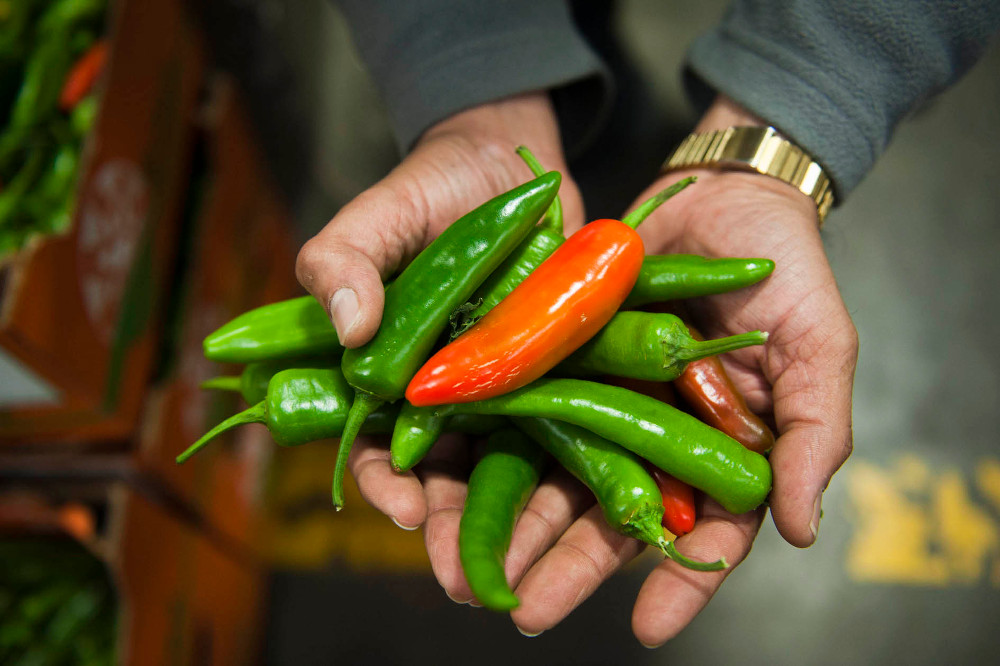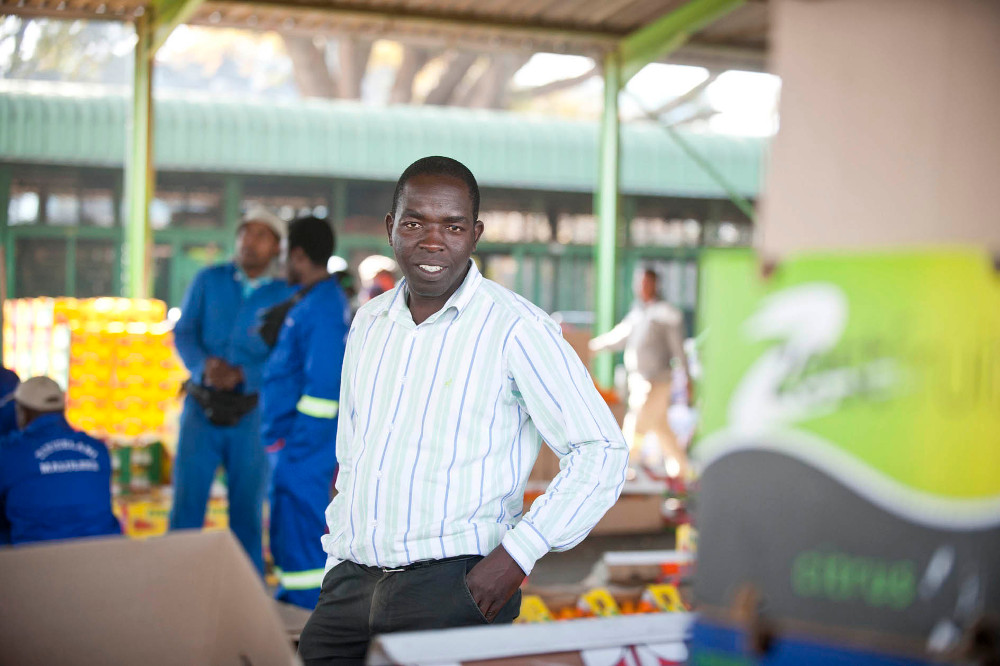The fresh produce market at City Deep is undergoing a three-year
There’s a sweet smell of ripe fruit in the air, intermingled with whiffs of diesel, sweat, instant coffee, dust and vetkoek. It’s 11am on a Saturday at Jo’burg’s City Deep fresh produce market – the world’s largest, according to its website. Shiny 34-tonne trucks and ancient small bakkies are pulled up next to concrete ramps and loading points outside the market agents. Teams of people are loading goods.
There are boxes of apples, avocados, onions, bunches of spinach, packets of herbs, metre-long cylindrical packets of chips and individually wrapped sweets in bulk. They’re being stacked and shoved and tied, using all-purpose twine and a great deal of elbow grease.
The owners of makeshift food stands dotted throughout the market are counting their day’s income and stowing away their unsold sandwiches.
In the vast tarred loading zone cum parking lot, pigeons fight over scraps and hover around greasy puddles.
Luxon Mudzimiri and Shadrack Thwalo have been up since 2am. They’re loading fruit, vegetables and herbs on to the back of a bakkie. Their 100kg of goods are minuscule compared with the one billion tonnes of produce sold at the market every year. But the few hundred rands spent by the two men will help make up the market’s R5-billion annual turnover.
Daily commute
For Thwalo, this is part of a daily commute between the market and his roadside stall in Midrand, a 60km round trip. He keeps his table and gazebo in his car, and sets up shop in the early morning to catch commuters on their way to work. His stall provides the first steady income he has seen in more than a decade. He was laid off as a warehouse manager 14 years ago. On a busy morning, he generates a turnover of about R1 500 in three hours.
“I used to work 14 hours a day and make R700,” Thwalo said. “Now I work for three hours a day and I make more than I did as a warehouse manager.”
He has regular customers. “My fruits are very fresh and they tell me my service is very good. Sometimes I give the customers bonsella. That helps to form relationships.”
His income helps to feed and clothe his family of six.
Mudzimiri comes to the City Deep market – part of Africa’s largest inland port and the fifth largest in the world – about three times a week. From the market, his destination is the bright lights and slot machines of the Emperor’s Palace casino on Johannesburg’s East Rand.
Mudzimiri, who has been in the vegetable industry for six years, supplies several restaurants. They place orders with him after closing every morning at 2am.
Bulk supply
He also owns a farm in Randfontein, more than an hour west of Johannesburg, that he visits several times a week.
“Supplying to restaurants makes economic sense,” Mudzimiri said. “This way I can move volumes. The vegetable industry is all about bulk because the margin is not high on individual products.”
The market’s history spans more than 100 years. Fully owned by the City of Johannesburg Metropolitan Municipality, it was established in 1893 at the Market Square in central Johannesburg, where 3 000 people would congregate to trade fresh produce. The economic boom emanating from the gold rush led to a further growth in trade, and new facilities were built in Newtown in 1913. The company reached an annual turnover of R1.5-million that year.

Some produce is always in demand and prices can spike dramatically when there are shortages. (Photos: Madelene Cronjé, M&G)
“By 1972, the market was bursting out of its seams,” said Hope Mabaso, the market’s senior marketing and communication manager. “This necessitated the Johannesburg City Council to conduct extensive research about best practices adopted by new markets. The research findings prompted the relocation of Jo’burg market facilities during September 1974 to its current 64-hectare site, built for R19.6-million at City Deep, which at the time had the capacity to handle 400 railway trucks per day.”
Trade has steadily increased since then. The market’s highest-selling commodity is potatoes, which last year brought in R1.3-billion, followed by tomatoes, that brought in R700-million. In fruit, apples gross the most sales, bringing in R380-million last year, followed by bananas netting R370-million.
Necessary upgrades
Upgrades have once again become necessary. The company is spending about R650-million between 2014 and 2017 to revamp infrastructure, redesign operations, expand warehouse facilities and bolster safety and quality processes. Once the “market of the future” project is complete, buying should be a lot friendlier and safer, Mabaso said.
“Parking and loading facilities will be improved, with a drive-through facility planned for customers with large buying capacity. Warehouse floor space will have increased by 40%.”
The market is a sales platform for about 5 000 farmers, who sell their produce to one of 14 market agents. They act as wholesalers.
Based on purchase value, 65% of the market’s sales go to wholesalers, processors and exporters; 27% goes to informal sector entrepreneurs such as Thwalo; and the remaining 8% is sold to retailers.
Nedzanani Pfunzo, who has come in for the day to help sell for Metro, one of the agents, said competition between the agents was fierce. “This market is an oligopoly,” he said.
The market publishes a price list that changes daily.
Price determination
Mabaso said: “The price is determined by the amount of produce available and the amount the buyer demands for purchase. Quality and packaging also play an intricate role in price determination.”
But the agents can adjust their prices. Pfunzo said, if the market price for apples was R28 a box, “you could try to say R32, depending on the quality and class of your product”.
Some products, such as ginger, were almost guaranteed to move. Its value also increased dramatically when in demand. A box, usually sold for about R80, could sell for R300 or R400 when it is scarce, he said.
Agents competed by trying to build up strong relationships with important clients.
“I must know what my customer wants,” Pfunzo said. “If I know my customer only buys Fuerte avocados, then, when I get a new load of Fuertes, I just give her a call.”
Sales commission
The market charges a fixed 5% commission on all sales made by the agents and it acts as a price setter.
“Jo’burg market’s unique central trading system, similar to that of the Johannesburg stock exchange, serves as a key price barometer for fresh produce in South Africa,” Mabaso said.

Street vending has provided Shadrack Thwalo with his first regular income in a decade.
Across the lot is a recently washed white Iveco truck. It’s parked alongside a delivery ramp, its thick tarpaulin side flaps pulled back to receive a load. The driver of the 34-tonne truck, Isaac Gamba, rests in the shade of his compartment in the front. He will be delivering produce to Kuruman in the Northern Cape. He and a co-driver will make the eight-hour trip with no rests. He has been driving for 19 years and loves what he does.
“I enjoy it very much because it gives me the opportunity to meet new people and see different places. I learn different cultures and the different attitudes of people.”
His favourite place is Kasane in Botswana: “There’s a lot of wild animals and a nice view.”
Great outdoors
The great outdoors helps to relieve the stress of the job.
Once Gamba was involved in a serious accident near the Mariannhill toll gate on his way to Durban.
“A truck came flying along the big bridge and smashed into the back of my trailer.”
He was carrying 20 tonnes of steel coils that came crashing forwards “like snooker balls”.
“I survived by the grace of God,” Gamba said.
When he’s not driving, he reads novels. At the moment, it’s Without a Hitch, by Marion Smith Collins, a book that proclaims itself as a “sensuous novel for the modern woman”.
Independent distributors
Flanking the market’s three main hubs – the fruit hub, the vegetable hub, and the potato and onion hub – are other independent distributors. There are meat and fish shops, liquor stores and wholesalers of sweets and confectionery.
On the far side of the road, in a ring around the hubs, is the Mandela People’s Market. A walk past the African-inspired murals on the public bathrooms and through a small gate leads to a collection of makeshift stalls manned by insistent vendors. Anyone so inclined can bargain for a box of ruby grapefruit, a packet of Fuji apples or a pineapple.
The first stall near the gate is that of Amos Khosa, who has worked there for three years, a trainee, who has been there for a few weeks, and an older woman who refuses to give her name and chides Khosa for doing so.
Business was tough, Khosa said. Although they turned over about R1 000 a day, the profit (after deducting inventory costs and a fee for their space) was split three ways.
The trainee shook his head and said it was not good.
But the customers feel differently. In the parking lot, Christian and Giselle Kalubi are adding fresh fruit and vegetables to the packets of chips and meat already in the boot of their silver Hyundai. They make the round trip of 100km once a month from their home in Centurion.
“It’s worth the trip,” said Christian, pointing to a big box of green peppers that he bought for R40. “In the grocery shop I would pay R20 for three.”